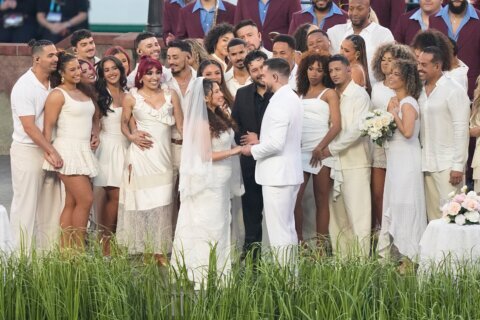WASHINGTON — For the last time, folks, Phoebe Robinson wants to let you know it’s not OK to touch her hair.
“Black women’s hair get touched a lot because I think, historically, there’s been a lot of confusion and not a lot of acceptance of black women’s hair, so when people see it, they just want to touch it,” said Robinson, a comedian, writer, actress and podcast host.
The title of her new book, “You Can’t Touch My Hair: And Other Things I Still Have to Explain,” is Robinson’s humorous and subtle reminder of what is and isn’t appropriate.
But the collection of essays is more than a list of “don’ts.” Page after page, Robinson tackles themes such as race, gender, pop culture and “my love of Oprah, my love of U2 and how I want to be married to Michael Fassbender,” she added.
Injecting humor into heavy topics is Robinson’s forte. On her two WNYC podcasts — “2 Dope Queens,” which she co-hosts with former Daily Show correspondent Jessica Williams, and “Sooo Many White Guys,” on which Robinson interviews performers, musicians and artists who are not white — she’s not afraid to broach subjects that make many squirm with discomfort.
Within minutes, the unease turns to laughter.
“Even though we talk about some kind of heavier topics, we still want the show to be a place of escape and a place that’s empowering for people,” Robinson said about her show with Williams, which is one of the most popular podcasts on iTunes.
“We just really try to make each other laugh, and if that works, then we feel that other people will laugh too. We’re not social justice people. But we really try to see if we can make something funny.”
Robinson, who also worked as a consultant on season three of “Broad City,” says the podcast medium has been the perfect place to make those connections and bridge those divides, due to radio’s intimate nature. (She listens to podcasts as she falls asleep.)
“Even if I am talking about heavy topics or tough topics, I still feel like I’m coming at it from a personal perspective,” she said.
That personal approach is also reflected in her New York Times Bestselling book, where Robinson writes about her experiences on being a black woman in comedy.
“I think it will speak to people and make them feel like they’re hanging out with their best friend,” Robinson said. “I like to say it’s like a bad feminist’s little sister.”
Next up on Robinson’s agenda is a new Amazon project from Jill Soloway, in which she has a reoccurring role, and amping up her stand-up schedule. Robinson says she is even exploring options for her own TV project.
But in the meantime, she has a more serious matter to attend to. When asked what change she wants to see for the next generation of women, Robinson’s response was quick.
“I would like for coded language to not be used toward women any more — like ‘she’s nasty,’ or making women feel bad if they choose to not be parents, or if they are parents, acting like they’re not capable of working,” she said.
“Just underestimating women, overall, and making them feel bad for being women — I’m hoping people will just realize that we’re half the population and we belong here.”
That’s pretty dope.






